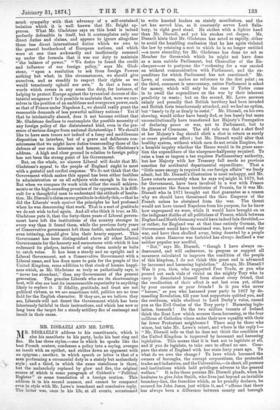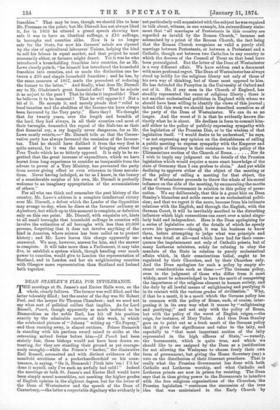millions of Catholics wince under their new equality with their
far fewer Protestant neighbours ? There may be those who franchise." That may be true, though we should like to hear Mr. Freeman on the point; but Mr. Disraeli has not always liked it, for in 1859 he uttered a grand speech showing how safe it was to have an identical suffrage, a £10 suffrage, in boroughs and counties alike. Now it is no longer safe for the State, for now his farmers' minds are ripened by the rise of agricultural labourers' Unions, helping the hind to sell his labour in equal market, and that project he must necessarily abhor, or farmers might desert. Yet it was he who introduced a householding franchise into counties, for as Mr. Lowe clearly puts it, "he himself has introduced the household franchise into counties, and so made the distinction one be- tween a i10 and simple household franchise ; and he has, by the same measure of 1867, made the precedent of reducing the former to the latter." And finally, what does Mr. Disraeli say to Mr. Gladstone's great financial offer ? That he rejects it as unjust to the poor ? That he thinks it impossible? That he believes it to be immoral ? That he will oppose it ? Not a bit of it. He accepts it, and merely pleads that " relief to local taxation and the abolition of the Income-tax have always been favoured by the Tory party." Have they? We thought that for twenty years, over the length and breadth of the land, they had always, in all their counties and most of their boroughs, demanded the repeal of the Malt-tax as their first financial cry, a cry happily never dangerous, for as Mr. Lowe neatly retorts,—" Mr. Disraeli tells us that the Conser- vative party has always favoured the remission of the Income- tax. That he should have disliked it from the very first is quite natural, for it was the means of bringing about that Free Trade which he so bitterly opposed. It is only to be re- gretted that the great increase of expenditure, which we have learnt from long experience to consider as inseparable from the advent to power of a Tory Ministry, has prevented the party from sooner giving effect or even utterance to these associa- tions. Never having indulged, as far as I know, in the luxury of a considerable surplus of his own, Mr. Disraeli is perfectly welcome to an imaginary appropriation of the accumulations of others."
For all who can think and remember the past history of the country, Mr. Lowe's address is a complete intellectual victory over Mr. Disraeli, a defeat which the Leader of the Opposition may avenge to-day, when he dines at the farmers' ordinary at Aylesbury, but which up to this moment is complete, or defective only on this one point. Mr. Disraeli, with exquisite art, hints to all small boroughs that household suffrage in counties will involve the extinction of all boroughs with less than 40,000 persons, forgetting that it does not involve anything of the kind in America, where science has been called on to protect history ; and Mr. Lowe leaves this charge apparently un- answered. We may, however, answer for him, and the answer is complete. It will take more than a Parliament, it may take five, to establish a system which, though handing over much power to counties, would give to London the representation of Scotland, and to London and her six neighbouring counties with Glasgow more representation than Scotland and Ireland both together.



































 Previous page
Previous page